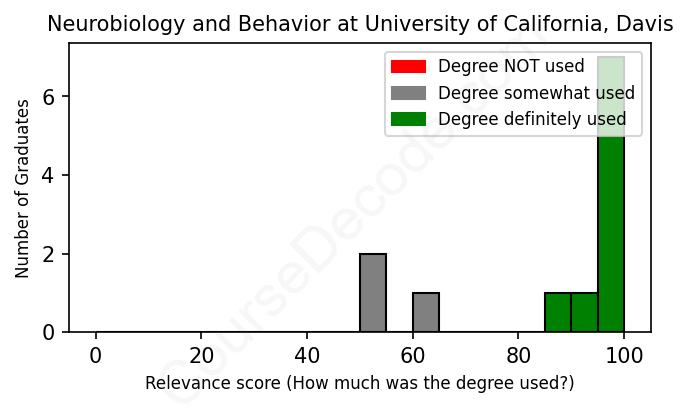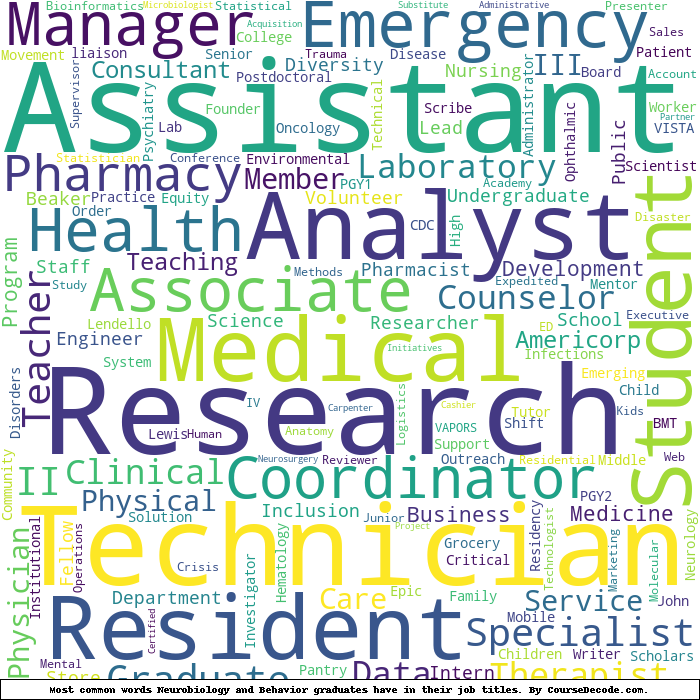
First, some facts. Of the Neurobiology and Behavior graduates from University of California, Davis we've analyzed , here's how many have used (or NOT used) their degree in their career:

These are estimates based on AI analysis of 12 LinkedIn profiles (see below).
The verdict? Significantly above average. Overall, with an average relevance score of 86%, Neurobiology and Behavior graduates from University of California, Davis have a much higher likelihood (+19%) of finding work in this field compared to the average graduate across all fields:
And for comparison, here's the chart for all profiles we've looked at across all degrees.
Also, after graduating, 50% of these graduates have pursued further education other than another Bachelor's degree (such as a Masters degree or other), compared to the average across all profiles of 35%. This suggests you may need more than just a Bachelors degree to be competitive as a Neurobiology and Behavior graduate.
See the details:
|
Relevance score: 97% We think this person has gone into a career highly relevant to their degree. We think this person has gone into a career highly relevant to their degree.
DEGREE INFOGraduated in 2019 from University of California, Davis with a Bachelor of Science - BS in Neurobiology and Behavior. Also pursued further education since (see below). JOB HISTORY SINCE GRADUATIONTutor KARE Learning Center Apr 2019 - Jul 2019 Resident Assistant  COSMOS UC Davis Jul 2019 - Jul 2019 Student Teacher  Natomas Pacific Pathways Preparatory Aug 2019 - Jul 2020 Middle School Science Teacher  Lodi Unified School District Aug 2020 - Aug 2022 High School Science Teacher  Natomas Pacific Pathways Preparatory Aug 2022 - Present FURTHER DEGREES DONE SINCE GRADUATINGMaster's degreeUniversity of California, Davis - School of Education 2019 - 2021 ABOUTTeaching Science |
The top 10 most common jobs done by the graduates we've analyzed (ranked most common to least) are:
From the analysis of LinkedIn profiles of graduates from UC Davis with degrees in Neurobiology and Behavior, it’s clear that many have found themselves in research-oriented roles or positions that apply their knowledge of the human brain and behavior directly. Common job titles include Postdoctoral Researcher, Research Associate, and various roles within emergency medicine like Emergency Medicine Resident and Physician. These positions not only align well with their academic background but require a deep understanding of neurobiology, making them highly relevant and a great fit for their education.
However, it’s also interesting to note that not all careers pursued by these graduates are directly tied to their degrees. Some have taken on roles like nursing, tutoring, and teaching, which utilize certain skills but may not delve deeply into the neuroscience aspects of their studies. For instance, while a physical therapist may have some relevant knowledge, their focus is more on rehabilitation than neurobiology. Similarly, many jobs like those in pharmacy or as a medical assistant tap into applicable skills without necessarily engaging the core components of neurobiology. So, while a good chunk of these roles directly benefit from their degrees, there’s certainly a variety that doesn’t fully leverage that specialized knowledge on a daily basis. Overall, a mix of hardcore research positions and somewhat related fields creates a diverse career landscape for these graduates.
Here is a visual representation of the most common words in job titles for Neurobiology and Behavior graduates (this is across all Neurobiology and Behavior graduates we've analyzed, not just those who went to University of California, Davis):

Looking at the career trajectories of graduates from UC Davis with a degree in Neurobiology and Behavior, it seems like many of them have found their way into relevant fields, especially within research and healthcare. Right after graduation, a common first step is taking on roles that are research-oriented, such as research associate positions at universities and medical institutions. For instance, graduates from 2011 and 2019 have both taken on roles as postdoctoral researchers or staff research associates, showing a strong inclination toward continuing education and practical research experience. Many graduates start in entry-level roles that lead to more advanced positions in scientific communication or healthcare, reflecting a solid foundation in their major.
Fast forward five to ten years, and you can see that some have advanced significantly in their careers. For example, alumni from 2014 and 2017 have transitioned into important healthcare roles like emergency medicine physicians and resident pharmacists, respectively. This indicates that the degree not only opens doors for research positions but also leads to careers directly impacting patient care and community health. However, not every graduate has followed a direct path. Some have taken detours into unrelated jobs like tutoring or working as a pharmacy cashier before finding their footing. Overall, while there might be a few who veer off the typical career paths, a good number of graduates appear to be steering toward promising careers that harness their education in neurobiology and behavior. It's a mixed bag, but leaning toward the positive side for many of these alumni!
Getting a Bachelor’s degree in Neurobiology and Behavior at UC Davis can be pretty challenging, to be honest. It’s a science-heavy program, so be ready for a lot of biology, chemistry, and neuroscience courses, along with research projects and possibly some lab work. If you love science and are good at it, you’ll likely find it engaging, but it can definitely be tougher than some of the more general degrees out there. Plus, the coursework is designed to really test your analytical skills and understanding of complex topics. So, if you enjoy diving deep into how the brain works and dealing with some rigorous material, you might find it rewarding, but be prepared to put in some serious effort!
Most commonly, in the LinkedIn profiles we've looked at, it takes people 4 years to finish a Bachelor degree in Neurobiology and Behavior.
Looking at these graduates from UC Davis, it seems like they’ve got a pretty mixed bag when it comes to making decent money. The ones in high-demand fields like medicine and pharmacy—like the Emergency Medicine Physician and the Pharmacist Resident—are likely raking in some solid paychecks, especially since those professions typically have higher salaries. On the flip side, there are some graduates in research or educator roles, like those working as a postdoctoral researcher or teacher, who might not be bringing in as much cash right off the bat. The AmeriCorps position also suggests that the pay isn’t very high, as those roles often come with stipends rather than full salaries. Overall, some are definitely in a good spot financially, while others are still on the climb or working in roles that might not pay as well initially.
Here is a visual representation of the most common words seen in the "about" section of LinkedIn profiles who have a Bachelor degree in Neurobiology and Behavior (this is across all Neurobiology and Behavior graduates we've analyzed, not just those who went to University of California, Davis). This may or may not be useful:

Here are all colleges offering a Bachelor degree in Neurobiology and Behavior (ordered by the average relevance score of their Neurobiology and Behavior graduates, best to worst) where we have analyzed at least 10 of their graduates:
| College | Score | Count |
|---|---|---|
 University of California, Davis University of California, Davis
|
86 | 12 |